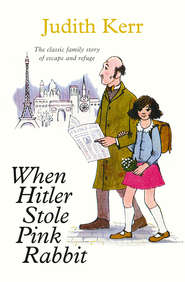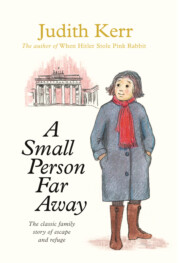По всем вопросам обращайтесь на: info@litportal.ru
(©) 2003-2024.
✖
Bombs on Aunt Dainty
Настройки чтения
Размер шрифта
Высота строк
Поля
“My dear,” said Mrs Bartholomew, “I must talk to you.”
Mei dea-r, thought Anna, automatically moving her fingers into position on an imaginary keyboard, Ei mus-t tor-k tou you. Lately she had developed this habit of mentally taking down in shorthand everything she heard. It had improved her speed and saved her from having to make sense of what she did not want to hear.
Mrs Bartholomew led her into the drawing-room.
“We have been advised by the American Embassy to return at once to the States,” she said.
Wea hav bean ad-veis-d bei the A-me-ri-can Em-ba-sea tou re-turn at wuns tou the Stai-ts, went Anna’s fingers, but then something in Mrs Bartholomew’s voice broke through her detachment.
“I’m so very sorry,” cried Mrs Bartholomew, “but we shall have to give up this house.”
Anna looked at her face, and her fingers stopped moving in her lap.
“What will you do?” asked Mrs Bartholomew.
It was nice of her, thought Anna, to be so upset about it. “I’ll be all right,” she said. “I’ll go and stay with my parents.”
‘But will they be able to manage?” asked Mrs Bartholomew.
“Oh yes,” said Anna airily. “And anyway, I’ll probably get a job quite soon.”
“Oh dear,” said Mrs Bartholomew, “I hate doing this.” Then she picked up the telephone to explain to Mama.
Mama always shouted when she was excited and Anna realised that of course she must have been hoping that the call would bring her news of Max. All the same, she wished that her sole reaction to Mrs Bartholomew’s news had not been so loud and accusing.
“Does that mean,” cried Mama, and her distorted voice came right out of the telephone to where Anna was sitting across the room, “that Anna won’t be able to stay in your house any more?”
Anna knew as well as Mama that there was no money to pay for her to stay at the Hotel Continental, but what was the use of shouting at Mrs Bartholomew about it? There was nothing she could do. Mama should at least have wished her a safe journey, thought Anna, and her fingers tapped out in her lap, shea shoud at lea-st have wi-shd her a sai-f jur-nea.
The Bartholomews began to pack up their possessions and a growing pile of garments was put aside for Anna because Jinny and Judy would not need them in America. She carried them to the Hotel Continental with her own, a few at a time, on the tube, so as to save a taxi for the move. Mama had counted all their money – she had added what was left of Papa’s earnings from the leaflets to the few pounds she had managed, somehow, to save from her meagre weekly wage, and she had worked out that there would be enough to pay Anna’s bills at the hotel for three weeks. After that they would have to see. It was really no use looking farther ahead. In the meantime they did not spend a halfpenny that was not absolutely necessary and Anna hoped that the Bartholomews would not mind her staying at the house until the last moment.
“Well, of course we don’t mind,” Mrs Bartholomew reassured her. “We’d love you to be here just as long as you can.”
All the same, as the preparations progressed and more and more familiar objects disappeared into packing cases, it began to feel rather strange. Judy and Jinny still played tennis and sat in the sun and chatted, but they were excited at the prospect of going to America and sometimes it was as though they had already gone. When the day for their departure arrived it was difficult to know what to say. They stood outside the house in Campden Hill Square and looked at each other.
“Promise you’ll write,” said Jinny.
“And don’t let any bombs drop on you,” said Judy.
Mr Bartholomew said, “We’ll be seeing you…” and then looked confused and said, “Good luck!”
Mrs Bartholomew hugged Anna and murmured, “Take care of yourself,” and then climbed quickly into the taxi, dabbing at her face with her handkerchief. Then the taxi drove off and Anna waved until it turned the corner. When it had completely disappeared she began to walk, slowly, towards the tube station.
The square was green and leafy and the chestnut tree at the bottom was covered with blossom. She remembered how, her first spring in England, Jinny had shown it to her and pointed out the “candles”. “Candles?” Anna had said. “Candles are only on Christmas trees,” and everyone had laughed. She could hear the plop of tennis balls from the courts where they had played only a few days before. When she reached the shop in Holland Park Avenue where they had always gone for sweets she stopped for a moment and looked in through the window. She was tempted to buy a chocolate bar as a sort of memento. But she would probably only eat it and then it would be a waste of money, so she didn’t. A poster outside the tube station said “Germans Reach Calais”.
It was May 26th, exactly a fortnight since Whitsun – the day Max should have started his exams.
Chapter Six (#ulink_05b50521-ae74-542c-9b7e-876481b06ee9)
At the Hotel Continental, Anna was allotted a small room close to Mama’s and Papa’s on the top floor.
When they had first come to England and still had some money they had lived lower down where the rooms were larger and more expensive, but Anna liked this better. From her window she could see right across the rooftops with only the sky above, or down into the scrappy yard, four storeys below, where cats fought among the dust and the weeds. A church clock nearby chimed out the quarters and sparrows hopped and fluttered on the sooty tiles. She was so busy settling into her new surroundings that she almost did not notice Dunkirk.
In a way it was quite easy to miss, even if one read the papers, which Anna didn’t, because no one said much about it until it was over. Dunkirk was a place in France on the Normandy coast, and at the end of May the retreating British army was trapped there by the Germans. Only the papers, trying to keep everyone cheerful, never quite said so in so many words. However, by fighting off the Germans and with the help of the Navy and the Air Force, nearly all the soldiers managed to escape back to England, and by the beginning of June the papers suddenly came out in triumphant headlines. “Bloody Marvellous!” said one, surprising Anna into reading it. She discovered that, apart from the Navy, thousands of ordinary people had crossed the Channel in tiny boats, again and again, to help take the soldiers off the beaches in the midst of battle. It was disappointing that what had sounded like a great victory was only an ingenious escape from defeat. But weren’t the English amazing, she thought. She could not imagine the Germans doing a thing like that.
The Hotel Continental had become very crowded. In addition to the German, Czech and Polish refugees, there were now Dutchmen, Belgians, Norwegians and French. You never knew what language you were going to hear in the narrow corridors and on the stairs. The Swiss waitress who had come to London to learn English complained constantly, and after supper the lounge was like the tower of Babel.
The streets, too, were in turmoil. Every day there were long crocodiles of children with gas masks slung over their shoulders, each with a label attached somewhere to its person, trudging in the wake of grown-ups who were taking them to the railway stations, to be sent out of London, to the safety of the country.
Everyone was talking about the invasion of England, for now that Hitler was only the other side of the Channel he would surely want to cross it. To confuse the Germans when they came, names were being removed from street corners and Underground stations, and even buses lost their destination plates, so that the only way to find out where they were going was to ask the conductor.
One morning on her way to the secretarial school Anna discovered a rusty car with no wheels and two broken bedsteads dumped in the middle of the grass of Russell Square. First she thought it was some kind of joke, but then the porter at the Hotel Continental explained to her that it was to stop German parachutists from landing.
“Could they really land in Russell Square? There doesn’t seem room,” said Anna, startled.
“There’s no knowing what they can’t do,” said the porter.
Parachutists were an inexhaustible source of speculation. There were endless stories of people who claimed actually to have seen some, disguised as British soldiers, as farm workers or most often as nuns, in which case, according to the stories, they always gave themselves away by their carelessness in wearing army boots under their habits.
Anna tried, as always, not to think about them, but sometimes in bed at night her guard slipped and then she saw them dropping down silently among the trees of Russell Square. They were never in disguise but in full uniform covered with black leather and swastikas which were clearly visible even though it was dark. They called whispered commands to each other, and then they set off down Bedford Terrace towards the Hotel Continental to look for Jews …
One morning after she had been kept awake a long time by her imaginings, she came down late to find a stranger sitting at the breakfast table with Mama and Papa. She looked more closely and discovered that it was George.
Mama was in a state of confusion between happiness and distress, and as soon as she saw Anna she jumped from her chair.
“Letters from Max!” she cried.
George waved an envelope. “I got one this morning, so I brought it round,” he said. “But I see you’ve got your own. They must all have been posted at the same time.”
“Max is all right,” said Papa.
She began quickly to read.
Вы ознакомились с фрагментом книги.
Приобретайте полный текст книги у нашего партнера:
Приобретайте полный текст книги у нашего партнера:









